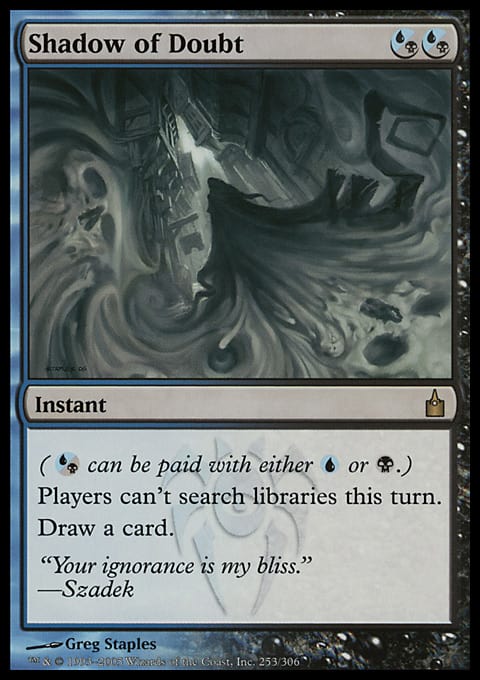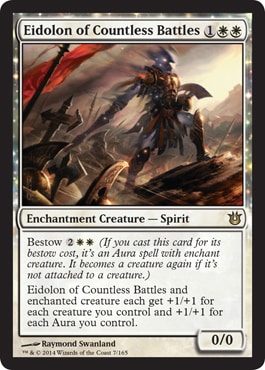Sometimes, I can hear their sighs even when the room is abuzz with twenty other conversations.
“I can’t believe I have to play against you again,” they’ll say, exasperated, throwing up their hands. “I always lose to you.”
Sometimes, they’re calm and congenial as we shuffle up for Game 1, but once I’ve won the match, they can’t avoid bringing up the subject.
“Well, it looks like you’ve beaten me again,” they’ll say, packing up their bags. “Good luck next round.”
Sometimes, I only vaguely recognize them—I play against so many different people—and I ask if we’ve played before.
“Oh yeah, you ran over me with your R/W aggro deck,” they quickly remind me. “I’m sure this match will be over just as fast.”
There are a handful of people like this at the local game stores I frequent, all with different play styles, personalities, and degrees of Magic experience. They have two things in common: I always seem to win when I play against them, and they always tell me that they feel they can’t beat me. I’ve encountered more and more of them as I’ve improved at the game, and I invariably feel uncomfortable playing against them, especially if I go on to win the match. Modesty and embarrassment factor in, of course, but there’s also this nagging sense that I’m not achieving my goals as a community leader. I don’t want to intimidate my opponents; I want to help them improve at Magic, and part of improving is getting over psychological hurdles like the belief that certain players are unbeatable.
At the Dragons of Tarkir prerelease, I won a match against an opponent I’d played against a few times before. When he brought up our lopsided match history, I tried to reassure him. I told him that players at every level felt the way he did, that I had even felt that way about certain players in the past. I realized as the words were coming out of my mouth that I wasn’t being helpful; instead, I was just rubbing salt in my opponent’s wounds. I resolved to think on the issue for a week or so and come up with some constructive advice—for my opponent’s sake and for yours.
Playing Fearlessly
Back in 2007, grinder-turned-game-developer Sam Stoddard wrote an article for StarCityGames.com called “Creating a Fearless Magical Inventory.” Sam felt he had hit a plateau in his career and wanted to critically examine his habits to increase his chances of success. “I took a long hard look at my game and I began to list the things that I secretly knew I was doing wrong,” he wrote. “Everyone makes mistakes but very few people own up to them . . . Remove your ego from the equation and you have room to improve your game.”
I came across Sam’s article about a year ago, and one item on his list really resonated with me: “I am overly confident when playing people I know or people who I believe are worse than me. I am under confident [sic] when playing people I don’t know or people that I believe are better than me.” My experience was similar to Sam’s: I didn’t have confidence issues when playing against strangers at Grand Prix because I never made assumptions about them (for all I knew, they were just as inexperienced as I was); it was the pros and established grinders, the people I knew were good players, who really got under my skin. I felt at ease around the new players at The Lady Planeswalkers Society and my peers at Friday Night Magic, but at Pro Tour Qualifiers, I was a nervous wreck.
I’ve had fits of nerves playing against tons of high-caliber players, but the guy I’m most afraid to face in a tournament is a Seattle local named Charles Wong. Charles is among the best Limited players in the area and one of the most confident aggro players I know. I first encountered him at a small Grand Prix Trial in 2013; I had only been playing Magic for a few months at the time, but I had heard of him and knew he was an accomplished player. His Sealed pool had yielded an aggressive Boros deck, so our match was over within a few minutes. I chalked up my loss to lack of experience—in Sealed, at Competitive REL, in Magic in general—but the truth is I was too afraid to put up much of a fight.
Over a year went by before I faced Charles again. I had improved significantly and gained quite a bit of confidence, and it showed: I was undefeated going into Round 4 of a PTQ for the first time in my career. When I checked the pairings and saw that Charles and I would be playing at Table 1, my heart sank. It was as though I had already lost the match.
At first, everything went fine. Once again, Charles had assembled an army of tiny white creatures, but he seemed unwilling to attack into my Ravenous Leucrocota. I had stabilized the board and was on track to win the game until I decided, for whatever reason, to start attacking him with my enormous Centaur Battlemaster. He attacked back and used Akroan Phalanx’s ability to deal lethal damage—a move I hadn’t considered while shakily doing the math. In Game 2, I went aggressive again, dropping Xenagos, the Reveler on turn four and sending my hasty Satyr tokens into the red zone, leaving my powerful Planeswalker vulnerable to a counterattack. Once he resolved an Eidolon of Countless Battles, it was all over. I had thrown away another match.
We chatted briefly while we packed up our cards, and Charles asked me why I made certain plays. The attacks I made were very aggressive, he said; if I’d held back in Game 1 and protected Xenagos in Game 2, he was confident that I would have won the match. I was very frank with him: “I’ve been playing Magic for less than two years now,” I said. “I get nervous and make mistakes when I play against people who I know are better than me.”
I wasn’t expecting anything from him, so what he said next surprised me. “Don’t let that get to you,” he replied. “It doesn’t matter.” Then he threw his deck box into his bag and stood up from the table. “See you in the Top 8,” he said, walking away.
Charles had much more experience playing Magic than I did—but more importantly, he had much more confidence in himself. He didn’t care how many accolades his opponents had; he was going to play his best and make Top 8. Like he said, his opponent’s level of skill and success didn’t matter. Yes, some players present larger challenges than others, but you’ll only handicap yourself further by believing that they’re infallible. No one is infallible; Magic is a game of variance, after all.
I made Top 32 of that PTQ, and afterward, my whole perspective on the game changed. I stopped dwelling on match histories and focused on winning matches. I worried about facing opponents based on what they were playing instead of who they were. I put up good fights against prominent grinders, and I sometimes won. I played against Gerry Thompson at a local 4K and wasn’t nervous. I stopped being so nervous in general.
You’re probably wondering if I ever beat Charles Wong. I never did, but beating him—or any other player—became less important to me. Beating The Unbeatable Opponent didn’t make me a better Magic player. Letting go of the myth of The Unbeatable Opponent improved my game drastically—and, somewhat ironically, I became The Unbeatable Opponent myself in the process.
Some Actual, Practical Advice
Dealing with The Unbeatable Opponent can be difficult, especially since (as a friend of mine pointed out when I recently discussed the subject with him) different opponents seem unbeatable for different reasons. For this article, I made a conscious choice to exclusively cover people who always seem to win for some reason. Other players are difficult to beat because they resort to underhanded trickery or try to put their opponents on tilt to steal wins. If you have an opponent who continually frustrates, offends, or belittles you, please go to your local judge, store owner, or tournament organizer. (You can also read my take on this issue in my article “On Angle-Shooting.”)
If your opponent falls into the former category, however, ask yourself why you’re so sure he or she is going to win. Is the matchup unfavorable for you? Is your opponent more experienced? Is card availability an issue? Or are you just nervous, as I was? Figure out which of these factors you can control, and take steps to improve. Take Sam Stoddard’s approach, and conduct an honest self-evaluation. Soon, you’ll be playing better, smarter Magic, and enjoying the game a lot more, too.






























